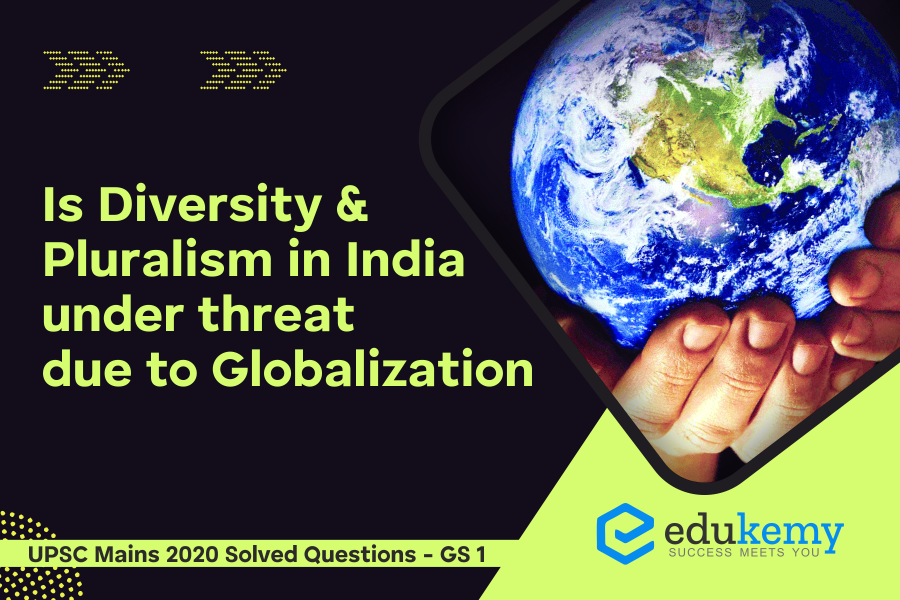The impact of globalization on diversity and pluralism in India is a subject of considerable debate. On one hand, globalization has brought about increased cultural exchange, economic growth, and exposure to diverse ideas. This has, in many ways, enriched the fabric of Indian society, fostering a global outlook and encouraging acceptance of different perspectives. However, there are concerns that globalization might pose a threat to indigenous cultures and traditional practices. The influence of Western values and the homogenizing effect of global markets could potentially erode the unique cultural tapestry that defines India. Additionally, economic disparities exacerbated by globalization may create social divides, impacting marginalized communities disproportionately. Striking a balance between embracing global opportunities and preserving the rich diversity and pluralism of India is a complex challenge that requires careful navigation in order to ensure that the benefits of globalization are inclusive and sustainable.
UPSC Mains General Studies Paper – 1 Mains 2020
Effects of Globalization on Indian Society
UPSC Mains Civil Services IAS Exam Question Paper – 2020
Contents
- 1 Structure of the Question
- 2 Answer
- 3 Conclusion
- 4 Frequently Asked Questions (FAQs)
- 4.1 Q: Is globalization eroding cultural diversity in India?
- 4.2 Q: How does economic globalization affect social inequality in India?
- 4.3 Q: Are local industries and traditional livelihoods at risk due to global economic integration?
- 4.4 Q: Does the globalization of media and communication compromise indigenous voices in India?
- 4.5 Q: How does globalization influence the educational landscape and knowledge systems in India?
- 5 In case you still have your doubts, contact us on 9811333901.
Structure of the Question
- In Introduction,
- Try to define globalization and present that globalization can be a threat and sometimes it is not a threat to values and culture.
- In Body,
- Assess both sides of globalization like how it is impacting pluralism and diversity.
- Mention, due to globalization, how the Indian culture and values reach out at international forums.
- Conclude on a positive and futuristic note.
Answer
Introduction
India is a diverse country and India’s significance lies in its interesting society. Globalization is the way toward growing and speeding up the development of thoughts, individuals, capital, and trade of products (labor and products) over immense distances. India essentially affects Indian social variety in both positive and negative manners.
Trends where diversity and pluralism are under threat due to globalization
Cultural and Traditional Homogenisation:
MNC culture has resulted in a central common language (English) and suppressing regional dialects, and minority languages. Their is “Mcdonaldization” of Indian Food habits, leaving behind their traditional cuisines.
Loss of community affiliation:
With rise in metropolitan of Indian population, the individualism is flourishing, and the social relations are now based on commercial benefits.
Family:
Economic migration and the choice for individual space have broken the joint structure of family in India. At this junction, the old-aged and children are deprived of the required care.
Homogenization of wants and thinking:
Global market decides what’s to be produced, resulting in low incentive for diverse products which means Loss of local artefacts, promotion of western dressing, shift from local culinary habits etc.

Diminishing of classical music over western music:
The changing taste of music among Indian youth has left a question mark over the survivability of traditional classical music in India.
Marriage:
The growing acceptance to the live-in relationship has questioned the sanctity of the institution of marriage in our society. It represents the dominance of western culture and the Indian way of living.
There is silver lining to this black thunder
- Spread of Indian Culture worldwide: Observance of International Yoga Day on 21st June has popularized the Yoga throughout the globe.
- Digitisation and Academic reach: It has helped in conservation of our culture, literary sources and heritage. Higher Literacy rate and Foreign Universities collaborating with Indian Universities.
- Example – National Manuscripts Mission is digitizing and sustaining India’s rich literary sources.
- Observance of World Hindi Day on 10th January and organization of World Hindi Conference.
- Indian festivals are now being celebrated across the world: The most significant example is the Diya stamps issued by UNO to celebrate Diwali. Even a local religious festival of Chhath Puja is celebrated in Silicon Valley, USA.
Conclusion
India is a place where there is diversity and pluralism. The exceptionally different nature of our way of life is the joining strength of India. Because of globalization, ladies in India have gotten more mindful of their privileges and are presently getting out of their homes to seek after tutoring as well as advanced education and occupations. Globalization to a degree went about as a bringing together power yet observed admittance would help India protect its multi-lingual, multi-strict, and multi-position society. Hence, it has both positive and negative impacts on diversity and pluralism generally speaking.
Frequently Asked Questions (FAQs)
Q: Is globalization eroding cultural diversity in India?
Globalization can lead to the widespread influence of Western culture and values. This can potentially threaten the rich cultural diversity in India by homogenizing lifestyles and preferences. Explore how globalization impacts traditional practices, languages, and cultural expressions in the face of global influences.
Investigate the connection between economic globalization and social inequality in India. Explore whether globalization contributes to the concentration of wealth in certain regions or social groups, potentially undermining the pluralistic fabric of society. Examine how economic disparities may lead to social tensions and divisions.
Q: Are local industries and traditional livelihoods at risk due to global economic integration?
Delve into the impact of globalization on local industries and traditional occupations in India. Explore whether the influx of multinational corporations and foreign products poses a threat to local businesses and livelihoods. Assess how this economic shift might contribute to social and economic imbalances within the country.
Q: Does the globalization of media and communication compromise indigenous voices in India?
Explore the role of media globalization in shaping public opinions and cultural narratives. Investigate whether the dominance of global media outlets undermines indigenous voices and perspectives. Examine the potential consequences for the pluralism of ideas and opinions within the Indian society.
Q: How does globalization influence the educational landscape and knowledge systems in India?
Examine the impact of globalization on education in India. Investigate whether the adoption of global educational standards and curricula leads to a dilution of indigenous knowledge systems. Explore the potential consequences for diversity in thought, intellectual traditions, and the preservation of local knowledge within the educational sphere.

In case you still have your doubts, contact us on 9811333901.
For UPSC Prelims Resources, Click here
For Daily Updates and Study Material:
Join our Telegram Channel – Edukemy for IAS
- 1. Learn through Videos – here
- 2. Be Exam Ready by Practicing Daily MCQs – here
- 3. Daily Newsletter – Get all your Current Affairs Covered – here
- 4. Mains Answer Writing Practice – here


